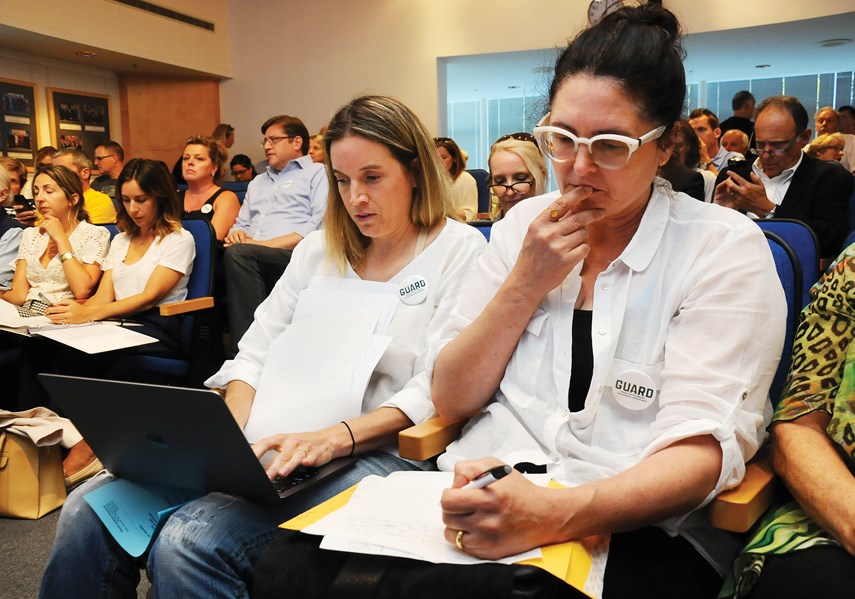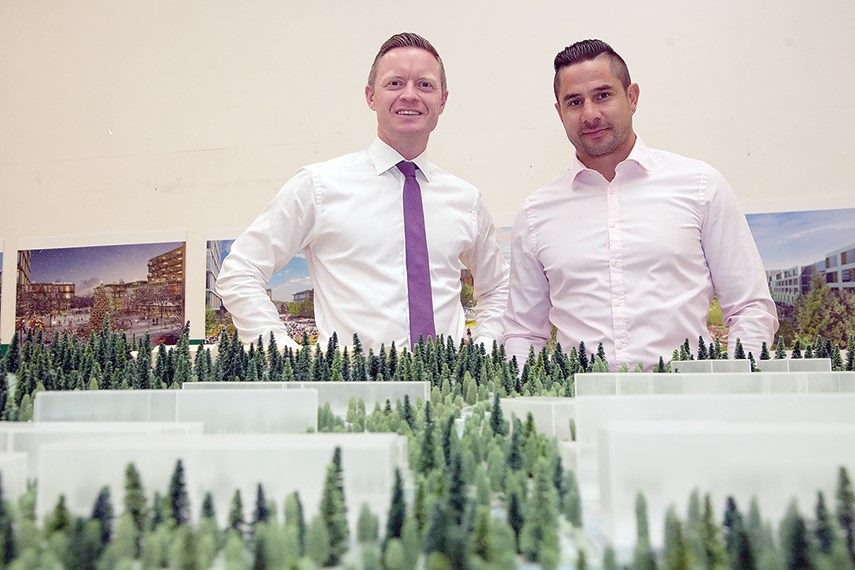A proposed innovation hub in the Maplewood area would benefit the quality of life of his people, according to Tsleil-Waututh Nation development manager Dennis Thomas.
“Our future generations are the reason why we are investing in this project,” said Thomas. “Enabling our youth to work, learn and live successfully in our community is what we are striving for.”
Opponents of the “Innovation District” say the 4,500 jobs and 680 residential rental units being proposed will bring added congestion to the area.
Maplewood North is a study in contrasts: on the one hand, it’s a 45-acre parcel of largely forested green space in Maplewood, just east of Seymour in the District of North Vancouver; on the other hand, it’s an abandoned gravel pit zoned for mining, garbage disposal and soil filtering.
This piece of land, owned by Darwin Properties and the Tsleil-Waututh Nation, has been the subject of intense scrutiny in recent months as a proposal to develop it into an Innovation District with commercial, light industrial and residential was met with a public outcry to slow down the process, resulting in council voting to put it on ice until after the October municipal election.
At the July 16 council meeting all members except Couns. Roger Bassam and Mathew Bond voted to postpone first reading until after the election. Meanwhile, Coun. Doug MacKay-Dunn called the reaction to the proposal “sticker shock.”
“This project was so huge that people couldn’t get their heads around it,” he said.
Coun. Lisa Muri said the large public reaction to the proposal showed that the broader public didn’t know about it.
“I believe the developer followed the process and protocol that the district laid out and I believe the district’s communication process was absolutely minimal in what should have happened on a project of this size,” Muri said, adding everyone wants jobs and affordable housing on the North Shore but “not at the expense of further gridlock and not at the expense of not understanding the environmental impact … (on) the Maplewood Conservation Area.”
The plan brought to council was for the 45-acre former gravel quarry on the Maplewood North Lands to be developed as an Innovation District which would include 1.4-million square feet of business space, 680 rental units, 220 residential units for students and faculty and $7.5 million in community amenities.
In response to council’s decision, Darwin Properties’ president Oliver Webbe said they respect the decision of council and “see this as an important opportunity for the community to attend our open houses and to learn more about the Innovation District.”
While the decision by council to delay the project was “unexpected,” said Thomas, it “gives our partnership an additional opportunity to engage with our neighbours and, together, ensure we develop a community that will provide opportunities for future generations.”
The Tsleil-Waututh Nation first worked with Darwin about 20 years ago to build a community gym, Thomas explained, and the fact that both are based in Deep Cove is important to the First Nations group.
“Both Darwin and Tsleil-Waututh Nation are both committed to community and have evolved with similar values,” Thomas said.

Much of the opposition to the project centred around traffic and congestion, and how such a large project would increase the number of cars on the already busy roads of Dollarton, Maplewood, Seymour and going into Deep Cove, as well as the loss of green space in Maplewood.
Nadine Sheppard, a Deep Cove resident, pointed out that her community is landlocked and can’t spread like other communities. She is worried that in the case of an emergency – a forest fire on Mount Seymour or an earthquake that might cause chlorine leaks – the 3,400 Deep Cove residents won’t get to the bridge because of all the other residents trying to flee. The Innovation District will just add to this, Sheppard said.
“We are living the pains of hyper development right now, seeing housing prices and taxes only rise with services staying the same and congestion becoming unbearable,” Sheppard said. “With each day, we feel the chokehold squeezing us toward maximum capacity with no way out.”
Of the 45 acres being proposed for development, 44 per cent would stay in the public realm and 32 per cent would be green space, explained Dan Milburn, director of planning, properties and permits with the District of North Vancouver. In addition, the developer has promised to build and maintain the parks, trails and plazas in perpetuity.
Milburn pointed out that the parks and open spaces include a forested area, the Windridge escarpment and wetlands. The plan also includes enhancing water flow to the current Maplewood Conservation Area, a bird sanctuary south of Dollarton Highway.
The Wild Bird Trust, which has stewardship of the Maplewood Conservation Area, has expressed its support for the Innovation District project and extensive research has gone into how to mitigate the loss of 30 acres of forest on the property. Mitigation plans include a wildlife corridor and reintroduction of Indigenous Coast Salish plants. Also, a water diversion system is being planned to bring water to the marsh area and the barge channel. To protect the salmon-bearing McCartney Creek, the Wild Bird Trust is asking for a wide buffer.
Darwin Properties and the Tsleil-Waututh are continuing with previously planned open houses right into September, despite the decision from council to put off first reading on their joint project.
The proponents are holding a total of nine open houses at the Innovation Campus, the site of the proposed development, and the main concern they have heard so far is the potential impact on traffic of the 4,500 jobs expected in the Innovation District, according to Webbe.
“Based on this feedback, we are considering changing some of offices’ uses within the development to uses that are more consistent with the needs of the community,” he said. “This is the only change we are contemplating at this time.”
The public consultation process is continuing to bring in ideas about the design of the buildings, but the project would also reflect First Nations’ culture through art, Indigenous botany, outdoor design, signage as well as stories and legends of the Tsleil-Waututh, Thomas explained.
Through the feedback, the developers found many residents weren’t aware of the traffic management plans to accommodate growth in the district over the next few decades, Webbe explained.
The provincial Ministry of Transportation is putting $200 million into refurbishing the interchanges in the area and this is expected to be completed by 2021. The district is also talking with TransLink to extend the planned B-Line service from Phibbs Exchange to Dundarave further west into Maplewood to service the Innovation District.
Milburn said the level of consultation on this project has been “unprecedented.” About 7,000 letters were sent to residents living west of the Seymour River. Normally, a consultation area would be within 100 metres of a project, and in this case, that would have been 125 addresses. There were also four pop-up meetings and a public information meeting in June.
Webbe, who lives in Deep Cove, said he’s disappointed in affordable housing options for young people on the North Shore.
“We need to do something about the housing crisis and we need to build the right type of housing,” he said. That’s why, he added, a key focus in the Innovation District plans is housing for people employed on the North Shore, for example, nurses who work at the Lions Gate Hospital and teachers who work at local schools.
Of the 680 residential rental units proposed, 450 will be for non-market rental at 10 per cent below market rent and will be for people working on the North Shore. Of the 220 units earmarked for private ownership, 50 must be occupied by employees of the North Shore.
“This is probably the most innovative approach to housing out of any development in B.C., period, and that’s something we’re very, very proud of,” said Webbe.
Webbe added that, in planning the Innovation District, his company made sure it was in alignment with the official community plan, and Maplewood Area Plan which was passed in November 2017.
Arc’teryx, whose headquarters are currently located just east of the proposed Innovation District on Dollarton Highway, is eyeing the Innovation District for its expanding needs. In a statement to the Crier, the outdoor clothing and equipment company’s president, Jon Hoerauf, said they will be needing more space for their head office in the coming years.
“We are undergoing the process of assessing available options,” he said in his statement. “One that shows promise is the North Shore Innovation District, a partnership between Darwin and the Tsleil-Waututh Nation – that would enable us to remain in North Vancouver and participate in a new model of mixed use, more sustainable, and creative development.” ■



